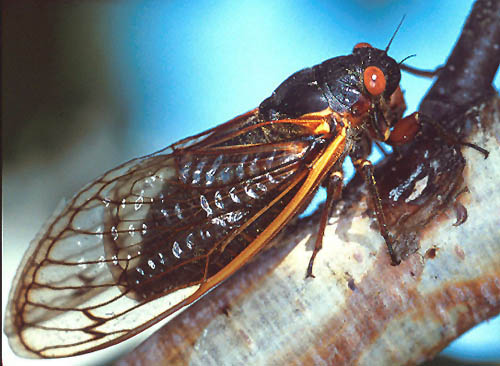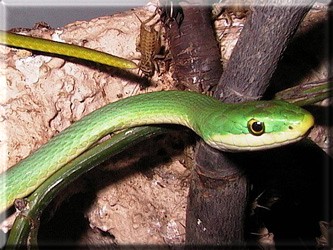How are you? I admit my posts have not been wildlife related as of late. But! That is soon to change.
Here are the creatures I've encountered recently.
On my Saturday birthday party (shout outs to everyone who bowled and chillaxed!) a grasshopper awaited R and I at our table. He evacuated to my pants leg.
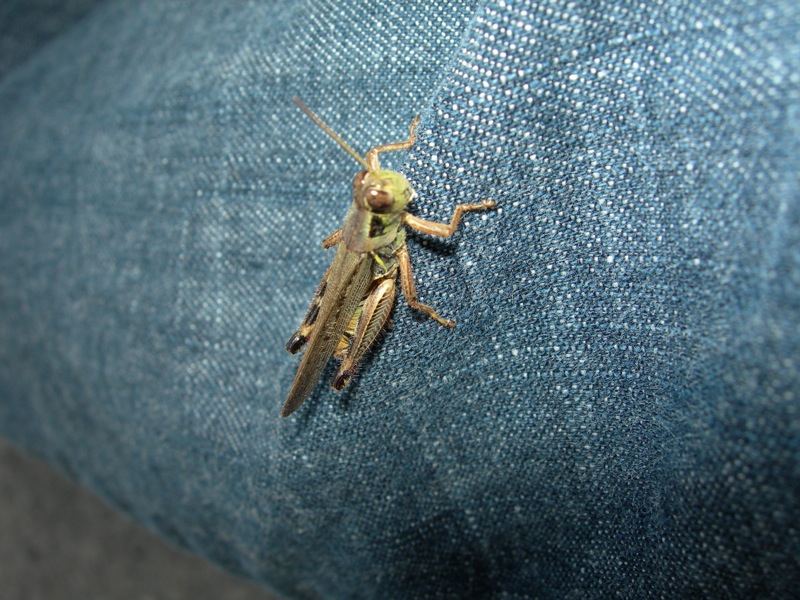
Sunday we ventured south to the B family homestead, where my Mom-in-law spotted these cicadas emerging from their old exo-skeletons!
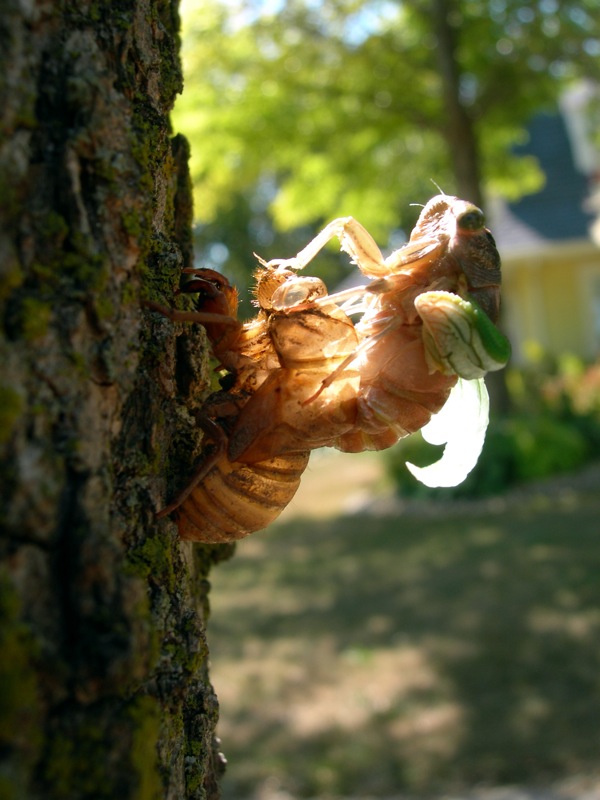
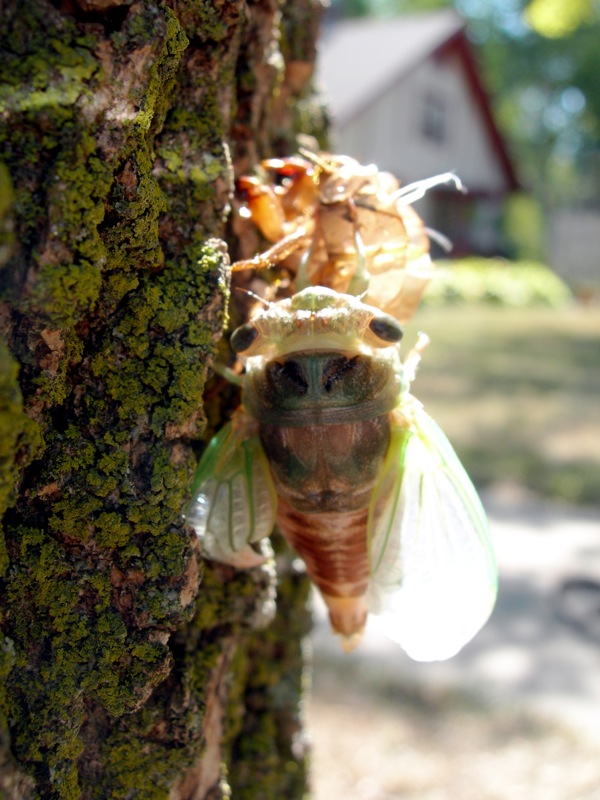
I think cicadas have cute faces, with their wide-set eyes.
Here is my cicada entry from my old blog, dated 7/12/2007:
Dear Critter Lovers,
Hello! Happy Thursday to you all. The last few days in Minneapolis have been those 75 degree, puffy cloud-filled sky days, my favorite. Daydreaming weather.
I can even see the sky from my new cube at my new temp job! I've never had a cube before; it's very exciting.
Critter Newz:
More trouble in the Middle East: Badgers?!?
Another mammoth fossil!
You've got to be squidding! (Lame joke.)
Check out this cool horsey. Yet another pet R needs to purchase for me!
Wow, I have several critter ideas for this blog; a bird request from my cousin Miss Lippy, bats, and a mammalian menace that is taking over the world!
Today our focus is the request of CN, Puccini soprano and recent birthday-girl. When CN was visiting her motherland of Chicago, she was accosted by cicadas! I think she is referring to the emergence of Brood XIII, according to the University of Michigan Department of Zoology page.
I think we saw one of these in St. Paul the other day. (Shout outs to the B family!)
Cicadas are members of Hemiptera, or the "true bug" order. They are present on every continent except Antarctica.
These bugs are famous for two things. First, they are the loudest insects in the world! Second, cicadas have dormant cycles of two to 17 years.
Male cicadas are the noise-makers (with females being the audience!) and obviously this music is love related. Unlike grasshoppers who rub their leg against their abdomen to create sound, cicadas have a pair little drum-like membranes, called tymbales, on their abdomen. They vibrate the tymbales, which resonate in special enlarged hollow chambers.
In addition to finding mates, cicada song can repel birds, and a special version of the song acts as a distress cry. Differences in cicada sounds are the most definitive way to identify individual cicada species.
Once the female is seduced by the male's song, he might sing a special courtship song to her. After mating, the female bites open slits in a nearby twig, into which she lays her eggs. Once they hatch, the nymphs drop to the ground, where their strong front legs bury them one to eight and a half feet. There they subsist on tree root juice.
After their dormant period, the nymphs emerge from underground, sometimes thousands in one night. They climb into trees and molt one last time there, emerging as snow white adults. After hiding in the trees and hardening up for a few days, the cicadas begin flying around, finding some plants to suck on, and searching for mates.
In the U.S., most cicadas are part of the Magicicada genus. These are cyclic in either 13 or 17 years. You'll note these are prime numbers, which is a strategy to avoid predators with three or five year tendencies from wiping them out. Primary enemies of the cicadas are insects too: the cicada killer wasp and the praying mantis.
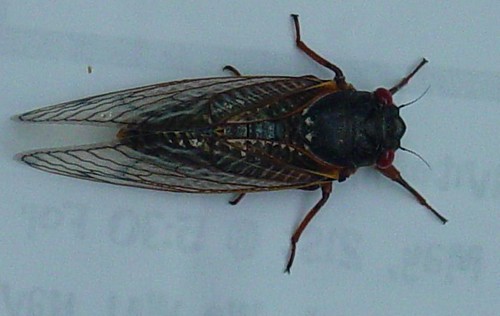
I think cicadas are cool-looking.
Cicada Fun Facts:
*Cicadas, particularly females, have been prized as a food source ever since ancient Greek times.
*They are harmless to humans.
*Chinese and Japanese healers grind up cicadas to help with hearing.
*They are not related to locusts, even though some people call them "13 year locusts."
*Adult cicadas are called "imagines"?
Finally, cicadas are special to me because I sang a song about them in my graduate voice recital.
Side Note: I obviously need to do an all-critter recital! (I don't know if there are any animal arias, though....)
The song, "O Cigale", was a setting of a Leconte de Lisle poem by the French composer Ernest Chausson, and alludes to the insect's song and mysterious life cycle. Here's an English translation by Laura Sylvis:
O cicada, born with fine days,
Poised from dawn on the green branches,
Happy to drink a little dew,
And kinglike, you always sing.
Blameless to all, peaceful and without guile, The happy worker, shaded by the oak tree, Hears you in the distance heralding summer. Apollo praises you as highly as the Muses,
And Zeus has given you immortality!
Hail, wise child of ancient earth,
Whose song invites eyes to close,
And who, beneath the intensity of the Attic sun, Having neither flesh nor blood, live like the Gods.
Let me know if you see any cicadas!
Back to 2008!
In Domestic Nemesis news, here is my advice to you. Do not spill most of a pitcher of orange juice inside of your refrigerator at 11 pm.
It even splashed on the ceiling of fridge!
Um, it is possible my refrigerator needed to be cleaned anyway....
Fridge cleaning really isn't as bad as it seems. After 45 minutes, everything had been washed, sanitized, wiped off and replaced.
No more juice puddle.
Finally, another critter. Two of these crossed the street in front of us...on Franklin Ave. just a few blocks west of St. Paul!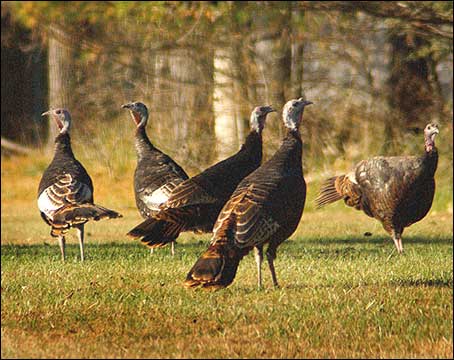
I hope the turkeys come to live with us.
Tomorrow is my birfday! Hugs and turkeys,
Wendell!
